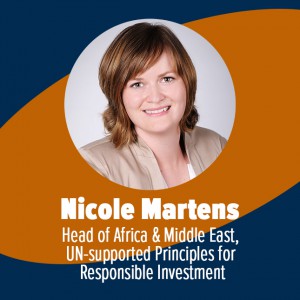The six key ESG principles you should know

 What do you think of when you hear ESG? Are you familiar with the basic principles? Nicole Martens, Head of Africa & Middle East at UN-supported Principles for Responsible Investment, and speaker at SuperReturn Africa, shares with us the six key principles that you should know when integrating ESG into your investment processes.
What do you think of when you hear ESG? Are you familiar with the basic principles? Nicole Martens, Head of Africa & Middle East at UN-supported Principles for Responsible Investment, and speaker at SuperReturn Africa, shares with us the six key principles that you should know when integrating ESG into your investment processes.
In my experience, discussions around ESG Integration tend to have a polarising effect on investors, creating a clear division between those in the ‘for’ and ‘against’ camps. Investors who are ‘for’ understand the concept of ESG integration and its undeniable relevance in today’s investment universe. Those ‘against’ remain unconvinced that ESG integration is either anything different from what they have always been doing or simply the latest fad and therefore not important enough to engage with fully.
Nicole Martens, Head of Africa & Middle East at PRI, highlights the challenges faced in the measurement and monitoring of impact investing and shares her insights on how it will continue to grow in Africa.
To overcome this scepticism, below is an outline of a few important principles to keep in mind when it comes to ESG integration.
1. Responsible Investment has nothing to do with anyone’s personal value system
The PRI defines Responsible Investment as an approach to managing assets that sees investors include environmental, social and governance (ESG) factors in their decisions about what to invest in and the role they play as owners and creditors.
This approach to investment has nothing to do with any moral, ethical or values-based system - this approach is one of financial prudence. Our mission at the PRI is to work toward the creation of a sustainable global financial system which relies on maximising sustainable long-term returns. Evidence shows that to generate these kinds of returns, investors are required to integrate ESG factors into their decisions.
2. ESG factors are financially material
Responsible Investment advocates for the integration of ESG factors into investment decisions, because these factors, traditionally considered ‘non-financial’, are financially material. There is increasing evidence on a global scale that shows how failing to adequately account for ESG factors can have significant financial implications. We need only take a look at cases such as BP, VW, Steinhoff, Facebook or African Bank, for examples of how failing to account for ESG factors at the start, ultimately leads to having to pay for that oversight later.
3. Responsible Investors do not sacrifice return
In 2016, a meta-study prepared by Deutsche Bank revealed that companies which effectively integrate material ESG factors into their operations outperform those that don’t. These companies are associated with lower costs of capital, better loan spreads and higher levels of customer loyalty, which ultimately, leads to greater potential for financial outperformance.
4. This is not a niche approach
PRI was established in 2006 by a small group of determined investors who believed that there was a more holistic way to make and manage investments. Now, in the fourth quarter of 2019, PRI has over 2,700 signatories around the world, representing over USD90trn in AUM. This is mainstream in every way. Our signatories include investors from all markets, and of all sizes – further evidence that implementation of Responsible Investment is key for any investor who makes the decision to prioritise it.
5. African investors are not exempt
I am often told that the need to be deliberate about ESG integration in investment decisions is somewhat diluted in the African context. After all, isn’t any investment in Africa by its very nature an impact investment? In short, no. Impact investment is something entirely different altogether, and just because an investment is understood to have some positive impacts, that doesn’t mean that the investment process should be somehow exempted from thorough calculation of risk-adjusted returns. To the contrary, ESG integration may be of even greater importance in the African context, since there are specific E, S and G issues which play themselves out in a comparatively more exaggerated way on the continent. Recent engagement with African PRI signatories revealed that investors consider issues of Climate Change, Human Rights and Labour Standards, Corruption and Water Scarcity to be of paramount importance in investment strategies because these ESG issues present significant risk to financial return.
6. Soon, investors won’t have a choice
At present, there are around 500 pieces of policy and regulation in place around the world related to ESG integration. More than half of these have come into play in the last five years. Policymakers and regulators are growing increasingly concerned about the slow pace of acceptance of an ESG-inclusive risk assessment approach to investment, and, especially considering international commitments that have been made regarding the transformation of the structure of economies (such as those of the Paris Climate Agreement), are increasingly intervening in the way that markets operate.
In PRI’s The Inevitable Policy Response (IPR) work, we outline what are the most likely interventions that policymakers and regulators will enact in the short to medium term. IPR encourages investors to engage in forward looking analysis and strategic planning to better prepare for transition and mitigate financial losses associated with these interventions. To quote the work: “The question for investors now is not if governments will act, but when they will do so, what policies they will use and where the impact will be felt”.
Against this backdrop, investors should consider: ‘Are we ready for an inevitable, forceful, abrupt, and disorderly transition toward ESG integration as the norm?’
---
Under the spotlight: Nicole Martens
In her role of Head of Africa & Middle East of the PRI, Nicole’s focus is on identifying and addressing the needs of African investors with respect to integrating ESG into investment processes in an effort to foster the maximisation of long-term sustainable financial returns across the continent. Prior to PRI, as a Development Economist, Nicole’s career has focused on supporting local and international organisations across the public and private sector in the design and implementation of strategies aimed at achieving large-scale developmental impact in Africa.